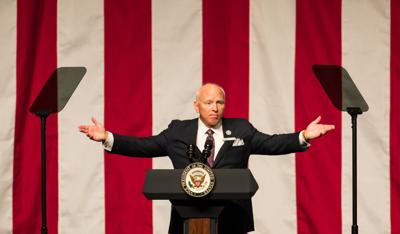Louisiana Republican Party officials want state lawmakers to forbid the study of racism at colleges and universities, arguing in a resolution approved Saturday that classes examining "inglorious aspects" of United States history are too divisive.
The resolution, passed by voice vote with no discernible dissent at the state party's quarterly meeting in Baton Rouge, asks the Legislature to pass laws removing diversity, equity and inclusion departments and agencies "within any institution of higher learning within the state." Without citing evidence, the resolution asserts that these programs have bloated budgets and inflamed political tensions on campuses.
The move comes amid efforts by Republican lawmakers nationwide to exert more control over educational materials and curricula, including books containing LGBTQ+ themes and classes about racism. They hope the effort will endear them to the GOP’s grassroots base as the party recovers from its 2022 midterm losses and prepares for the 2024 presidential election.
Aligned with Trump
The Louisiana GOP chapter has remained mostly aligned with the national party's far-right factions, rallying in support of former President Donald Trump ahead of his arrest this month and endorsing Trump acolyte Jeff Landry, the state attorney general, for governor. That stance has repeatedly stirred controversy for local party leaders.
In approving Saturday's resolution, state party officials urged the Legislature to take steps similar to those of other conservative states that have considered curtailing programs deemed to increase tribalism and hostility on campuses.
The resolution targets both classroom content promulgating critical race theory and efforts to improve diversity in higher education staffing and campus programming. It criticizes LSU and University of Louisiana System programs run by Claire Norris, a UL system administrator, for dedicating money and staff to diversity, equity and inclusion, or DEI, offices.
The measure argues that "DEI bureaucracies" act as "divisive ideological commissariats" and that critical race theory makes students feel less rather than more welcome.
College leaders push back
The resolution drew a rebuke from University of Louisiana System President Jim Henderson, who in a written statement called the depiction of life on campuses "so foreign to the reality at our institutions it defies comment."
"We make no statement on the inner workings and platform development of political parties. That is their business," Henderson said. "That said, the naming of an invaluable member of my staff is unnecessary and inappropriate. She is an exemplary professional and an asset to Louisiana and higher education."
Louisiana Commissioner of Higher Education Kim Hunter Reed said in a statement that the Board of Regents stands by its programming.
"Programs that support student success and strengthen a sense of belonging on campus and in the wider community are important and impactful, yielding positive results in student completion," Reed said.
Critical race theory
Critical race theory is a lens through which racism is seen as systemic in U.S. institutions, which function to maintain the dominance of White people in society.
Many Republicans view the concepts underlying it as an effort to rewrite U.S. history and to persuade White people that they are inherently racist and should feel guilty for their advantages. But the term also has become something of a catchall phrase to describe race and racism concepts to which conservatives object.
Saturday's anti-DEI measure is similar to a plan backed by Florida Gov. Ron DeSantis and being considered by the legislature there to block state colleges from having programs on diversity, equity and inclusion and critical race theory. GOP-controlled statehouses in Iowa, Missouri, Texas and elsewhere are also scrutinizing higher education diversity initiatives.
While no laws curtailing studies of racism or critical race theory have been proposed in Louisiana, a House resolution filed by Rep. Valerie Hodges, R-Denham Springs, asks for schools to report studies of such issues to the state.

